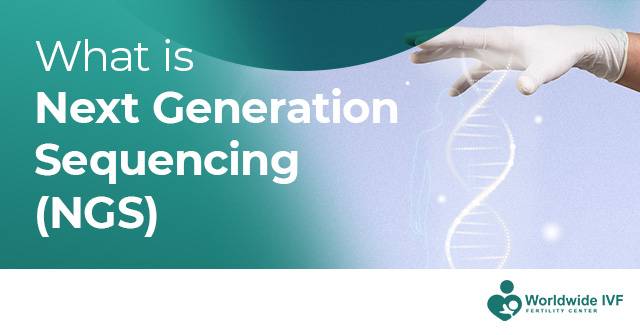
This groundbreaking genetic analysis technology has opened new doors in the realm of fertility treatments, particularly in vitro fertilization (IVF). If you’ve ever struggled with unsuccessful IVF attempts or faced the heartbreak of recurrent miscarriages, Next Generation Sequencing (NGS) could provide a solution. NGS plays a pivotal role in revolutionizing genetic analysis before embryo implantation. In this article, we share our insights on the power of NGS in identifying and rectifying the unseen genetic intricacies, ultimately fostering greater prospects for successful pregnancies.
Unveiling the Essence of Next Generation Sequencing
Before delving into the realm of NGS, it’s crucial to comprehend what this technique is all about. Next Generation Sequencing stands at the forefront of evolutionary genetic analysis technology. It’s a revolutionary process enabling comprehensive chromosomal screening, revealing hidden genetic anomalies within embryos. Whether it’s incomplete cell division, embryo quality concerns, or imperceptible chromosomal aberrations, NGS can be a powerful asset here, a solution to the enigmatic causes behind failed IVF attempts and recurrent miscarriages. Over half of IVF failures can be attributed to factors like embryo quality, incomplete cell division, or genetic abnormalities that elude the naked eye. These hidden issues could prevent you from reaching your dreams of pregnancy.
Who is a Good Candidate for Genetic Screening? 4 Examples
Determining who benefits from NGS is pivotal. This transformative technique particularly aids:
- Unsuccessful IVF Recipients Without a Known Cause: If you’ve undergone multiple IVF cycles without success, and the reason remains a mystery, NGS might shed light on the underlying issues.
- Women with a History of Recurrent Miscarriages: Recurrent miscarriages can be emotionally devastating. NGS can help identify chromosomal abnormalities in embryos, potentially preventing further heartache.
- Women Aged Over 38 Years: As maternal age increases, the likelihood of chromosomal abnormalities in embryos rises. NGS can provide essential insights for women over 38 years old.
- Women with a History of Chromosomal Abnormalities in Prior Pregnancies: If you’ve experienced pregnancies with chromosomal abnormalities, such as Down syndrome, NGS can be an invaluable tool for assessing future embryos.
What Are the Methods of Genetic Screening?
Two primary methods stand out in the spectrum of genetic screening:
- Preimplantation Genetic Diagnosis (PGD): PGD is a method that screens for genetic disorders by examining specific chromosomes. This technique focuses on a selection of critical chromosome pairs, including pairs 13, 18, 21, X, and Y. While it offers valuable insights, it does not cover all 23 pairs of chromosomes.
- Microarray: Microarray is another genetic screening method, but it stands apart from PGD due to its ability to screen all 23 pairs of chromosomes. This comprehensive approach significantly boosts the success rate of treatment. By delving into the entire chromosomal landscape, Microarray provides a more thorough analysis, increasing your chances of a successful pregnancy.
What Are the Strengths of Next Generation Sequencing?
The capabilities of Next Generation Sequencing extend beyond mere genetic disorder identification. This cutting-edge genetic analysis technology is revolutionizing the world of fertility treatments, particularly in the context of IVF.
This groundbreaking technology offers a myriad of advantages, here are three such examples:
- Extensive Chromosomal Examination: NGS facilitates an in-depth analysis of all chromosomes, unveiling intricate numerical and structural differences that might escape conventional screening methods. This is especially crucial for patients with recurrent miscarriages and prospective mothers over the age of 38. By leveraging NGS, we can significantly enhance the chances of a successful pregnancy by transferring embryos that have been deemed healthy from a chromosomal perspective.
- Precision in Identifying Mosaicism: Identifying cells with differing chromosome structures, termed “mosaic,” is a defining strength of NGS. This precision in identification becomes instrumental in treatment strategies.
- Holistic Examination: Beyond gene disorders, NGS also delves into detecting chromosomal defects. Under optimal conditions, it even allows simultaneous single-gene disease analysis and HLA typing, which is used to match patients and donors for blood or marrow transplants, demonstrating its comprehensive nature.
What sets NGS apart is its ability to swiftly and efficiently screen embryos, making it possible to detect genetic issues at the chromosomal level before pregnancy even occurs. As you might be aware, one of the primary reasons behind unsuccessful pregnancies lies in chromosomal disorders within the embryo. Even if embryos produced through IVF are successfully transferred to the uterus, these hidden issues can hinder an otherwise healthy pregnancy.
NGS Sequencing Healthcare Support
The revolutionary potential of Next Generation Sequencing redefines the landscape of genetic screening before embryo implantation. It’s not merely about identifying genetic anomalies but about empowering individuals facing fertility challenges with the potential for successful pregnancies.
Consider NGS with our specialized medical professionals to enhance the chance of a successful pregnancy. Our fertility specialists will provide a thorough examination that goes into the chromosomal level, identifying any abnormalities that could hinder further development. This also includes determining the sex of the embryo, whether it is male or female. Contact our fertility clinic today for more information.

Author
Author
Dr. Thitikorn Wanichkul, M.D.
Expertise: Obstetrics-Gynecology, Gynecologic Laparoscopic Surgery, Infertility Treatment
Dr. Thitikorn Wanichkul, M.D.
Expertise: Obstetrics-Gynecology, Gynecologic Laparoscopic Surgery, Infertility Treatment